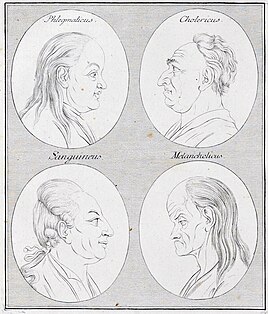See also
| This disambiguation page lists articles associated with the title F scale. If an internal link led you here, you may wish to change the link to point directly to the intended article. |
F scale may refer to:
The California F-scale is a 1947 personality test, designed by Theodor W. Adorno and others to measure the authoritarian personality. The "F" stands for "fascist". The F-scale measures responses on several different components of authoritarianism, such as conventionalism, authoritarian aggression, anti-intraception, superstition and stereotypy, power and "toughness," destructiveness and cynicism, projectivity, and sex. Scores acquired from the F-scale could be directly associated with background components, educational level, and intellectual capacity. It is an indirect type of test that ensures the result would not be due to the individual's fake responses; this is possible because the purpose of the measurement and which attitude is being measured are initially concealed from the participants. The existence of this correlation could possibly affect the way in which the F-scale accurately measures the authoritarian personality syndrome. The F-Test has two principal purposes: it aims to measure prejudice and anti-democratic tendencies at the personality level.
The Fujita scale, or Fujita–Pearson scale, is a scale for rating tornado intensity, based primarily on the damage tornadoes inflict on human-built structures and vegetation. The official Fujita scale category is determined by meteorologists and engineers after a ground or aerial damage survey, or both; and depending on the circumstances, ground-swirl patterns, weather radar data, witness testimonies, media reports and damage imagery, as well as photogrammetry or videogrammetry if motion picture recording is available. The Fujita scale was replaced with the Enhanced Fujita scale (EF-Scale) in the United States in February 2007. In April 2013, Canada adopted the EF-Scale over the Fujita scale along with 31 "Specific Damage Indicators" used by Environment Canada (EC) in their ratings.
The Minnesota Multiphasic Personality Inventory (MMPI) is a standardized psychometric test of adult personality and psychopathology. Psychologists and other mental health professionals use various versions of the MMPI to help develop treatment plans; assist with differential diagnosis; help answer legal questions ; screen job candidates during the personnel selection process; or as part of a therapeutic assessment procedure.
| This disambiguation page lists articles associated with the title F scale. If an internal link led you here, you may wish to change the link to point directly to the intended article. |
Psychometrics is a field of study concerned with the theory and technique of psychological measurement. As defined by the US National Council on Measurement in Education (NCME), psychometrics refers to psychological measurement. Generally, it refers to the field in psychology and education that is devoted to testing, measurement, assessment, and related activities.
Personality psychology is a branch of psychology that studies personality and its variation among individuals. It is a scientific study which aims to show how people are individually different due to psychological forces. Its areas of focus include:

The Myers–Briggs Type Indicator (MBTI) is an introspective self-report questionnaire indicating differing psychological preferences in how people perceive the world and make decisions.
Psychological testing is the administration of psychological tests, which are designed to be "an objective and standardized measure of a sample of behavior". The term sample of behavior refers to an individual's performance on tasks that have usually been prescribed beforehand. The samples of behavior that make up a paper-and-pencil test, the most common type of test, are a series of items. Performance on these items produce a test score. A score on a well-constructed test is believed to reflect a psychological construct such as achievement in a school subject, cognitive ability, aptitude, emotional functioning, personality, etc. Differences in test scores are thought to reflect individual differences in the construct the test is supposed to measure. The science behind psychological testing is psychometrics.
Psychology is an academic and applied discipline involving the scientific study of human mental functions and behavior. Occasionally, in addition or opposition to employing the scientific method, it also relies on symbolic interpretation and critical analysis, although these traditions have tended to be less pronounced than in other social sciences, such as sociology. Psychologists study phenomena such as perception, cognition, emotion, personality, behavior, and interpersonal relationships. Some, especially depth psychologists, also study the unconscious mind.
An F-test is any statistical test in which the test statistic has an F-distribution under the null hypothesis. It is most often used when comparing statistical models that have been fitted to a data set, in order to identify the model that best fits the population from which the data were sampled. Exact "F-tests" mainly arise when the models have been fitted to the data using least squares. The name was coined by George W. Snedecor, in honour of Sir Ronald A. Fisher. Fisher initially developed the statistic as the variance ratio in the 1920s.

A personality test is a method of assessing human personality constructs. Most personality assessment instruments are in fact introspective self-report questionnaire measures or reports from life records (L-data) such as rating scales. Attempts to construct actual performance tests of personality have been very limited even though Raymond Cattell with his colleague Frank Warburton compiled a list of over 2000 separate objective tests that could be used in constructing objective personality tests. One exception however, was the Objective-Analytic Test Battery, a performance test designed to quantitatively measure 10 factor-analytically discerned personality trait dimensions. A major problem with both L-data and Q-data methods is that because of item transparency, rating scales and self-report questionnaires are highly susceptible to motivational and response distortion ranging all the way from lack of adequate self-insight to downright dissimulation depending on the reason/motivation for the assessment being undertaken.

Raymond Bernard Cattell was a British and American psychologist, known for his psychometric research into intrapersonal psychological structure. His work also explored the basic dimensions of personality and temperament, the range of cognitive abilities, the dynamic dimensions of motivation and emotion, the clinical dimensions of abnormal personality, patterns of group syntality and social behavior, applications of personality research to psychotherapy and learning theory, predictors of creativity and achievement, and many multivariate research methods including the refinement of factor analytic methods for exploring and measuring these domains. Cattell authored, co-authored, or edited almost 60 scholarly books, more than 500 research articles, and over 30 standardized psychometric tests, questionnaires, and rating scales. According to a widely cited ranking, Cattell was the 16th most eminent, 7th most cited in the scientific journal literature, and among the most productive, but controversial psychologists of the 20th century.

The Big Five personality traits, also known as the five-factor model (FFM) and the OCEAN model, is a taxonomy for personality traits. When factor analysis is applied to personality survey data, some words used to describe aspects of personality are often applied to the same person. For example, someone described as conscientious is more likely to be described as "always prepared" rather than "messy". This theory is based therefore on the association between words but not on neuropsychological experiments. This theory uses descriptors of common language and therefore suggests five broad dimensions commonly used to describe the human personality and psyche.
The authoritarian personality is a personality type characterized by extreme obedience and unquestioning respect for and submission to the authority of a person external to the Self, which is realized through the oppression of subordinate people. Conceptually, the term "authoritarian personality" originated from the writings of Erich Fromm, and usually is applied to men and women who exhibit a strict and oppressive personality towards their subordinates.
The California Psychological Inventory (CPI) is a self-report inventory created by Harrison Gough and currently published by Consulting Psychologists Press. The test was first published in 1956, and the most recent revision was published in 1987. It was created in a similar manner to the Minnesota Multiphasic Personality Inventory (MMPI)—with which it shares 194 items. But unlike the MMPI, which focuses on maladjustment or clinical diagnosis, the CPI was created to assess the everyday "folk-concepts" that ordinary people use to describe the behavior of the people around them.

The Psychopathy Checklist or Hare Psychopathy Checklist-Revised, now the Psychopathy Checklist—revised (PCL-R), is a psychological assessment tool most commonly used to assess the presence of psychopathy in individuals. It is a 20-item inventory of perceived personality traits and recorded behaviors, intended to be completed on the basis of a semi-structured interview along with a review of 'collateral information' such as official records.
The Sixteen Personality Factor Questionnaire (16PF) is a self-report personality test developed over several decades of empirical research by Raymond B. Cattell, Maurice Tatsuoka and Herbert Eber. The 16PF provides a measure of normal personality and can also be used by psychologists, and other mental health professionals, as a clinical instrument to help diagnose psychiatric disorders, as well as help with prognosis and therapy planning. The 16PF instrument provides clinicians with a normal-range measurement of anxiety, adjustment, emotional stability and behavioral problems. It can also be used within other areas of psychology, such as career and occupational selection.
The Narcissistic Personality Inventory (NPI) was developed in 1979 by Raskin and Hall, and since then, has become one of the most widely utilized personality measures for non-clinical levels of the trait narcissism. Since its initial development, the NPI has evolved from 220 items to the more commonly employed NPI-40 (1984) and NPI-16 (2006), as well as the novel NPI-1 inventory (2014). Derived from the DSM-III criteria for Narcissistic Personality Disorder (NPD), the NPI has been employed heavily by personality and social psychology researchers.
The Revised NEO Personality Inventory is a personality inventory that examines a person's Big Five personality traits. In addition, the NEO PI-R also reports on six subcategories of each Big Five personality trait.
Enneagram is a compound word derived from the Greek neoclassical stems for nine and something written or drawn. Enneagram may refer to:
In the field of personality psychology, Machiavellianism is a psychological trait centered on interpersonal manipulation, unemotional coldness, and indifference to morality. Though unrelated to the historical figure or his works, the trait is named after the political philosophy of Niccolo Machiavelli, as psychologists Richard Christie and Florence Geis used edited and truncated statements inspired by his works to study variations in human behaviors. Their Mach IV test, a 20-question, Likert-scale personality survey, became the standard self-assessment tool and scale of the Machiavellianism construct. Those who score high on the scale are more likely to have a high level of deceitfulness and callousness.